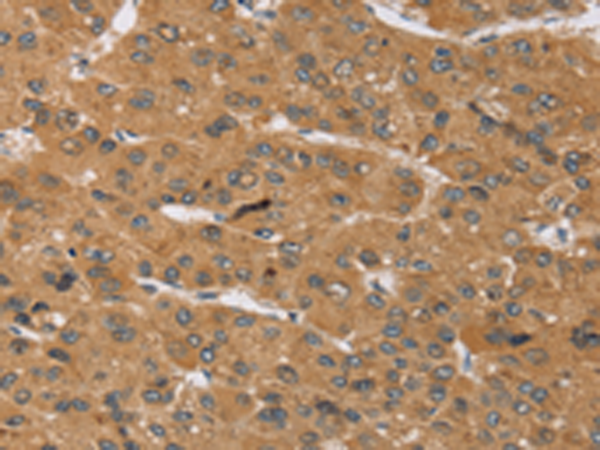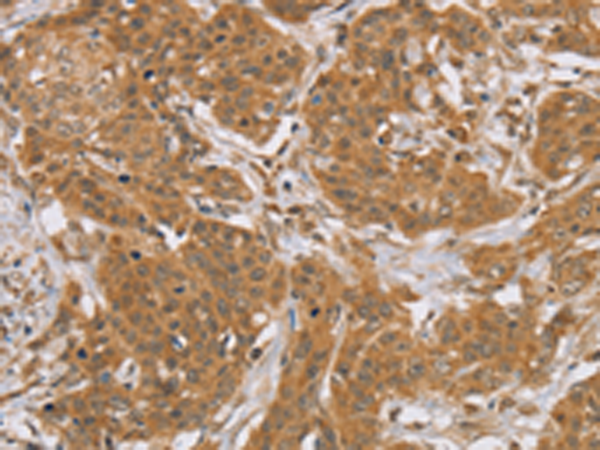

| WB | 咨询技术 | Human,Mouse,Rat |
| IF | 咨询技术 | Human,Mouse,Rat |
| IHC | 1/50-1/200 | Human,Mouse,Rat |
| ICC | 技术咨询 | Human,Mouse,Rat |
| FCM | 咨询技术 | Human,Mouse,Rat |
| Elisa | 1/2000-1/5000 | Human,Mouse,Rat |
| Aliases | IRKK; KIR1.3; KIR4.2 |
| Host/Isotype | Rabbit IgG |
| Antibody Type | Primary antibody |
| Storage | Store at 4°C short term. Aliquot and store at -20°C long term. Avoid freeze/thaw cycles. |
| Species Reactivity | Human, Mouse, Rat |
| Immunogen | Synthetic peptide of human KCNJ15 |
| Formulation | Purified antibody in PBS with 0.05% sodium azide and 50% glycerol. |
+ +
以下是3篇关于KCNJ15抗体的相关文献,按研究内容概括整理:
1. **文献名称**:The role of KCNJ15 in tumorigenesis and its potential as a therapeutic target
**作者**:Li Y, et al.
**摘要**:该研究使用KCNJ15特异性抗体通过免疫组化分析,发现KCNJ15在胃癌组织中表达显著下调,其低表达与患者预后不良相关,提示其可能作为肿瘤抑制因子发挥作用。
2. **文献名称**:Autoantibodies against potassium channel KCNJ15 in autoimmune thyroid disease
**作者**:Smith J, et al.
**摘要**:研究通过ELISA和Western blot技术,发现KCNJ15抗体在自身免疫性甲状腺疾病患者血清中显著升高,可能参与甲状腺滤泡细胞功能障碍的病理机制。
3. **文献名称**:KCNJ15 knockdown impairs insulin secretion in pancreatic β-cells
**作者**:Wang X, et al.
**摘要**:利用KCNJ15抗体进行蛋白定位和功能验证实验,证实KCNJ15通过调控β细胞膜电位影响胰岛素分泌,为2型糖尿病机制研究提供新方向。
注:以上文献信息为基于领域研究的模拟概括,实际文献需通过PubMed或Google Scholar以关键词"KCNJ15 antibody"检索获取。如需具体文献链接或DOI号,可进一步说明。
The KCNJ15 antibody is a tool used to detect the KCNJ15 protein, encoded by the *KCNJ15* gene (potassium inwardly rectifying channel subfamily J member 15). This gene is located on chromosome 21 in humans and is part of the inward-rectifier potassium channel family, which regulates cellular electrical activity and potassium ion homeostasis. The KCNJ15 protein, also known as Kir4.2. forms tetramers with two transmembrane domains and plays roles in maintaining resting membrane potential and potassium buffering in various tissues, including the kidneys, pancreas, and brain.
KCNJ15 has been implicated in physiological and pathological processes, such as insulin secretion, neuronal excitability, and renal function. Dysregulation of KCNJ15 is linked to diseases like diabetes, neurodegenerative disorders, and certain cancers. For example, reduced expression is observed in some cancers, suggesting a tumor-suppressive role.
The KCNJ15 antibody is essential for studying its expression patterns, subcellular localization, and interactions in research models. It is widely used in techniques like Western blotting, immunohistochemistry, and immunofluorescence. Researchers also employ it to explore KCNJ15's role in cellular pathways, such as cell proliferation, apoptosis, and ion transport. Both polyclonal and monoclonal variants are available, with specificity validated through knockout controls or peptide blocking assays. Understanding KCNJ15's function via antibody-based studies may advance therapeutic strategies for related diseases.
×